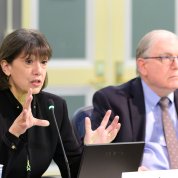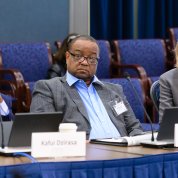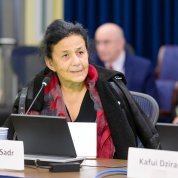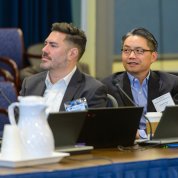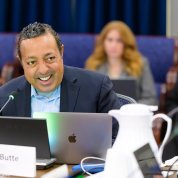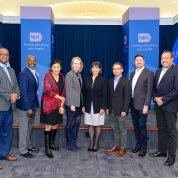Realizing Science’s ‘Amazing Potential’
New Director Convenes 127th ACD Meeting

Photo: Marleen Van Den Neste
The advisory committee to the director (ACD) convened for two days late last year for the first time under NIH Director Dr. Monica Bertagnolli, who began by acknowledging the tremendous promise and challenges currently facing the greater biomedical science enterprise.
“Right now, we have an unprecedented opportunity to embrace and increase access to innovation,” she said, after sounding the gavel on Dec. 14 to start the 127th ACD meeting, held in-person in Wilson Hall and online. “Has there ever been an environment like we are in right now? Fundamental science remains critical. You will hear a lot from me about application to the clinical environment, but please do not ever think that our commitment to fundamental science is wavering in any way. We just want to see that amazing potential coming out of our research laboratories get to people faster.”

Photo: Marleen Van Den Neste
Addressing one of the speedbumps to getting NIH research to the citizens it’s meant to serve, Bertagnolli spoke briefly about ways to build back faith in the core work.
“I’d like to do everything I possibly can to help restore trust in science,” she said. “I believe that means we have to directly engage people in science, promoting equity in science and leaving no one out. We will go far in restoring trust when people who stand to benefit from our research become our research partners, when we design studies that engage them and respect their needs, and when people see that the results of our science make their lives better. We need to meet people where they are and reach out to people underrepresented in science.”
Also on day one, the group was briefed on NIH’s budget and legislative outlook as well as the UNITE initiative, the agency’s think tank for addressing and eliminating structural racism in the workforce.

Photo: Marleen Van Den Neste
Afternoon presentations included reports about NIH’s response to the maternal mortality crisis and the future of ECHO, or Environmental Influences on Child Health Outcomes, now in its seventh year.
The final report of the day included recommendations from the working group on catalyzing development and use of novel alternative methods to advance biomedical research.
ACD day two entertained updates on the All of Us Research Program, Rapid Acceleration of Diagnostics initiative and NexTRAC—the novel and exceptional technology and research advisory committee, which provides both recommendations to the NIH director and a public forum to discuss scientific, safety and ethical issues associated with emerging biotechnologies.

Photo: Marleen Van Den Neste
The two-day session closed with a report from the ACD working group on re-envisioning NIH-supported postdoctoral training. Attracting, nurturing and sustaining early-career investigators has become a top priority for NIH and the biomedical research community at large.
“We are heading into challenging times financially over the next few years,” said Bertagnolli. “If you ask me what is the single thing that keeps me awake at night as new NIH director, it’s the next generation and how we make sure we support them.”
Recordings of both days of the ACD are archived online at https://videocast.nih.gov/watch=52608 and https://videocast.nih.gov/watch=52610. Find meeting materials at https://acd.od.nih.gov/meetings.html.

